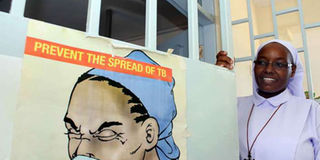Kenya pledges Sh623m to fight Aids, TB, malaria

Sister Veronicah Wanjiru of Mbungoni Catholic Clinic in Mombasa displays information about tuberculosis on February 26, 2016. TB is one of the most deadly disease in Kenya. PHOTO | JOSEPH KANYI | NATION MEDIA GROUP
What you need to know:
- This money will allow the Global Fund to support affected countries, such as Kenya, with a view to saving 16 million lives, preventing 234 million new infections .
- Donations are used to directly finance programmes to prevent and fight the diseases, which together kill about 2.5 million people every year.
Money is raised by private and public sector donors during a replenishment conference.
Kenya will contribute $6 million (Sh623 million) to programmes to fight Aids, tuberculosis and malaria as other international donors made pledges for the next three years to help fight the epidemics.
This is a 20 per cent increase from the Sh500 million pledged at the fifth replenishment meeting in 2016.
Every three years, the Global Fund to Fight Aids, Tuberculosis and Malaria holds a conference to replenish its financial resources. At this event, all public and private sector donors announce their financial pledges.
16 MILLION
Kenya is not only a donor but also an implementer of Global Fund-supported programmes. The money was promised at the launch of the Fund’s sixth replenishment conference held on Wednesday and Thursday in France’s third-largest city Lyon.
The conference was hosted by French President Emmanuel Macron. Guests also include the Global Fund’s partners and civil society, both of which are involved in mobilisation efforts and programme implementation in their countries.
The conference, which ended Thursday, aims to raise as much as possible to fund this fight for the next three years. The aim is to gather more money than during the last funding conference in 2016 ($12.2 billion).
This money will allow the Global Fund to support affected countries, such as Kenya, with a view to saving 16 million lives, preventing 234 million new infections and continuing to finance innovations and improvements for health systems.
PROGRESS
This commitment is essential if these three pandemics are to be eliminated by 2030.
Donations are used to directly finance programmes to prevent and fight the diseases, which together kill about 2.5 million people every year.
The international community risks seeing setbacks in fighting the diseases. To protect the progress made to date and rise to the challenges, nations need to join forces and step up efforts to achieve Sustainable Development Goal 3 (universal access to health).
Since the Global Fund was created, it has saved 32 million lives. But despite the progress made, challenges still need to be addressed because in 2018, 37.9 million people were HIV-positive and the number of new cases was again rising in about 50 countries.
STAGNATED
Malaria also killed more than 435,000 people in 2017 and progress has stagnated since 2015.
France was one of the founders of the Global Fund. It is fully committed to the Fund’s governance and has contributed €4.61 billion (Sh527.4 billion) since the Fund was created in 2002, making it the second-largest contributor.





